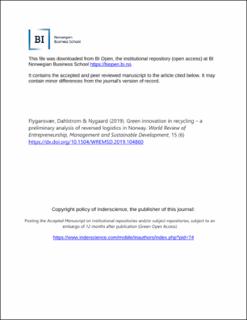Green Innovation in Recycling, - A Preliminary Analysis of Reversed Logistics in Norway.
Peer reviewed, Journal article
Accepted version
Permanent lenke
https://hdl.handle.net/11250/2643826Utgivelsesdato
2018Metadata
Vis full innførselSamlinger
- Publikasjoner fra CRIStin - BI [1015]
- Scientific articles [2181]
Originalversjon
World Review of Entrepreneurship, Management and Sustainable Development. 2019, 15(6). 10.1504/WREMSD.2019.104860Sammendrag
Abstract There has been an exponential growth of new electronic products in the global consumer market. New electronic consumer products generate a growing need for new methods, processes and entrepreneurship in recycling. In this study, we examine how entrepreneurs involved in the recycling of electronic products innovate to create a more sustainable circular economy. The recycling system must take care of electronics that contains hazardous materials. Also, a recycling system should prevent the waste of potentially useful materials. Thus, entrepreneurship is crucial to improve the handling of toxic material and processing technology to reuse valuable elements. Innovation therefore is essential to facilitate a sustainable recycling process. In this study, we analyse entrepreneurial innovation in the light of the organisational structure of the recycling system. Following a study of 108 recycling entrepreneurs, competition and specific investments are found to be important factors that drive the sustainable innovation that make Norway one of the countries with the highest recycling rates of electronic and electric waste. Green Innovation in Recycling, - A Preliminary Analysis of Reversed Logistics in Norway.
